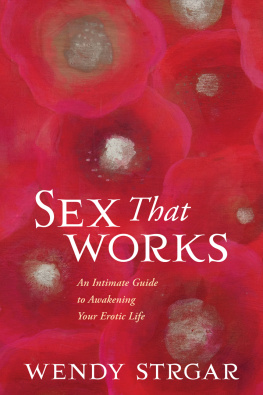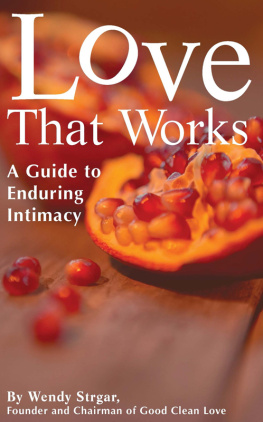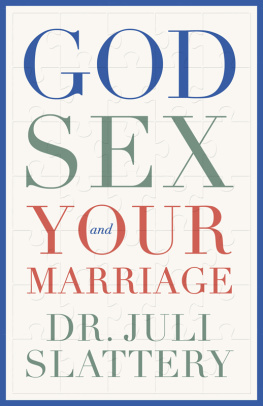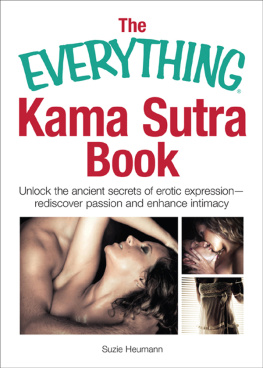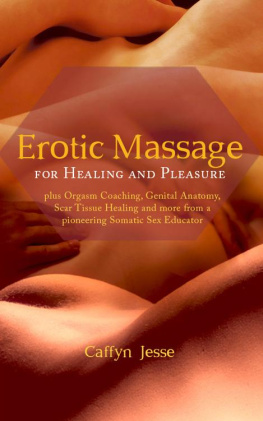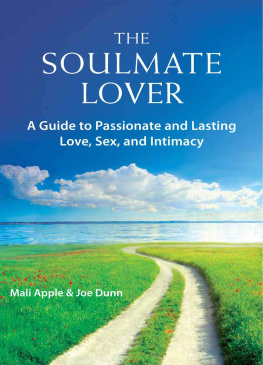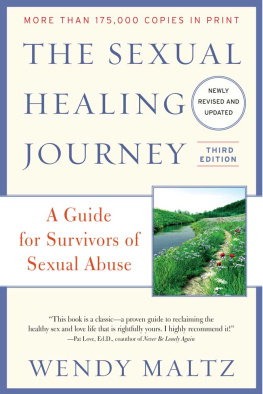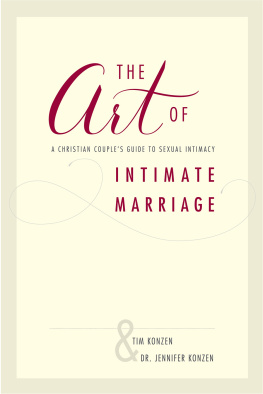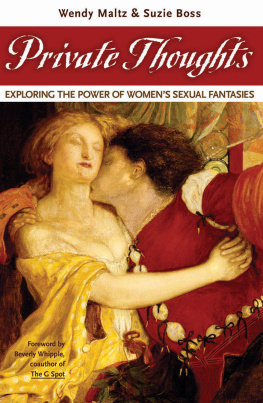
For Franc
and the mystical, healing, wondrous love we make.

And for our childrenEmma, Luke, Ian, and Anastasia
who have taught my heart to feel everything.
The way you make love is the way
God will be with you.
RUMI
CONTENTS
Creating a path to sexual freedom ~ Taking responsibility for your sexual evolution ~ Healing our harmful behaviors ~ Claiming erotic freedom ~ Overcoming silence ~ Giving yourself permission ~ Finding forgiveness
As a medium of communication ~ Restoring our humanity ~ Orgasm ~ Relaxing our judgments about sexuality ~ The many benefits of self-pleasure ~ Owning the pleasure response ~ Calling pleasure by its true name ~ Transcendent orgasms ~ Broadening our sexual vocabulary ~ Pleasure as a fountain of youth
The universal uncertainty ~ Bridging the erotic with the rational ~ Putting sexual health in context ~ In isolation or community ~ The Sexual Identity Grid ~ The malady of sexual dysfunction ~ Trusting our erotic nature ~ Beyond right and wrong
The gift of choice ~ Growing up sexually ~ Living well with risks ~ Befriending our fear ~ The four attributes of courage ~ Desire as courage ~ Daily practice ~ Becoming who you really are ~ Healing erotic wounds ~ Letting our erotic self teach us
Humanitys beguiling capacity ~ Overcoming sexual boredom ~ Filling in the gaps of our sexual education ~ Exploration as the leader ~ Sensory intrigue ~ Opening as a creative act ~ Awakening to life, sexual and otherwise
Awakening the senses ~ Out of the head and into the body ~ Trusting erotic impulses ~ Building a vocabulary of scent and taste ~ The healing language of touch ~ Erotic connections ~ Making noise ~ Negotiating shared sensations ~ Mindfulness ~ Falling into the body
Eliciting arousal through stories ~ Witnessing your fantasies ~ Fantasies as charged erotic fuel ~ The space between witnessing and enacting ~ Inner erotic landscapes ~ Uncovering the subconscious source of pleasure~ Expressing desire ~ Submission and domination
How attention heals us ~ Listening ~ Making the time ~ A radical leap ~ Creating a love container ~ Sustaining an atmosphere conducive to intimacy ~ Showing up vs. coexisting ~ Compassion as a way to connect ~ Sourcing from our center ~ Committing to something bigger than ourselves
Letting go and receiving ~ Grateful sex ~ Healing through kindness ~ Receiving abundance ~ The importance of sexual freedom, revisited ~ Gratitude makes sex work ~ A simple gratitude practice ~ You are a product of love ~ A passionate love affair with your fleeting life
INTRODUCTION
LEARNING TO FEEL
A good friend of mine recently told me that her resolution for this year was to become more human. She laughed as she shared the story of how some of her friends from Silicon Valley didnt quite understand what she meant.
I am serious, she said. I want to feel more.
Her desire struck me because in many ways it seems to be the opposite of what we, as a culture, want. Our lives are increasingly dominated by digital gadgets that offer at best a superficial connectivity, though they allow unprecedented productivity. Thanks to technology, we get more done and faster. Feelingswho has time for those? And when our relationships begin to fail, when our sex lives disappear, we look for quick fixesprescriptions for libido, energy enhancers, casual encounters. We search the Internet, when really it is time to begin to look within.
Maybe its no wonder; learning to feel isnt easy. Feelings are like weather patterns: they are changeable and powerful, and if they reflect the nature of the moment, they can also distract and even frighten us with their intensity. Small children are frequently shaken by the power of their feelings. When was the last time you witnessed a temper tantrum in the grocery store, a giant storm raging inside a little body? What happened when your feelings were too big to hold when you were a child? What could happen if you let yourself experience those feelings now?
Yet our ability to experience and share our feelings in meaningful ways is one of the profound marks of our humanity. Our feelings, as my friend recognized, are what make us human.
One thing that I have learned is that without a capacity to feel, we cannot build or sustain intimate relationships. For the past twelve years, Ive been studying love, thinking and writing about sexual intimacy as an integral part of building lasting relationships and sustaining health. Since I study love, loveologist is the best name for my occupation. Im also a successful entrepreneur of love products, which means on the days when Im not flying on a plane for seven hours to go to a trade show or a sales meeting, Im in the office wrestling with the everyday challenges of running my business. What isnt part of my official biography is that for a woman in her fifties, I have an amazing, off-the-charts sex life. Ive been married to the same man for over thirty years, and the depth and breadth of intimacy that I enjoy with my husband not only has been the concrete in the foundation of my marriage but also the inspiration in all my work.
Getting here was by no means easy for me. I grew up in a violent household, where my fathers experience of all emotions was limited to a single expression: anger. His rage toward women exponentially expanded after my parents devastating divorce, and it was confusing and frightening when this rage was directed at me.
Yet in the midst of all this unpleasantness, I was curious about feelings, as kids often areespecially the intense pleasures I was able to experience with my body. Once, after finding the word masturbation in an Ann Landers column, I asked my father what it meant. In his crass New York way, he yelled back, It means jerking off!
That was the extent of my sex education at home. It taught me not to ask questions. It would be a long time before I learned to stop associating pleasure with guilt and shame.
My first sexual experiences, in my late teens and early twenties, were with dangerous, destructive menguys who were, no big surprise, jerk-offs. Looking back, I have no doubt that I would have continued down that dark, destructive path had it not been for the help of a therapist my mother (very uncharacteristically) encouraged me to see. I expect that had I not begun, with the help of my therapist, to articulate and feel all of the sadness and anger of my childhood, I would have destroyed myself with men who cared nothing for me. Instead, I had the good fortune to begin the work that has made possible the strong relationship I have with my husband. In fact, all of the loving relationships I now havewith my family, friends, and myself are possible only because of the work Ive done (and am still doing) to learn to feel.
The truth is, the only way to true presence in our lives is through our bodies. This is the lesson Ive learned. When we reach that place of true presence, everything, including sex, becomes vivid and interesting. But being truly present also means we continually risk feeling pain. This explains our rampant self-medicatingwith pills, food, TV, addictive substances of all kinds; we will do anything to numb ourselves to the unpleasant feelings that are part of being human and fully living in our bodies.
But feelings dont work that way. We cant selectively numb ourselves only to the unpleasant ones. When we choose the route of avoidance and addiction, we end up numbing ourselves to all of our feelings, including the desirable ones. For too many peoplemillions, actuallya satisfying erotic experience is often inaccessible because they have abandoned their capacity to feel.
Next page
